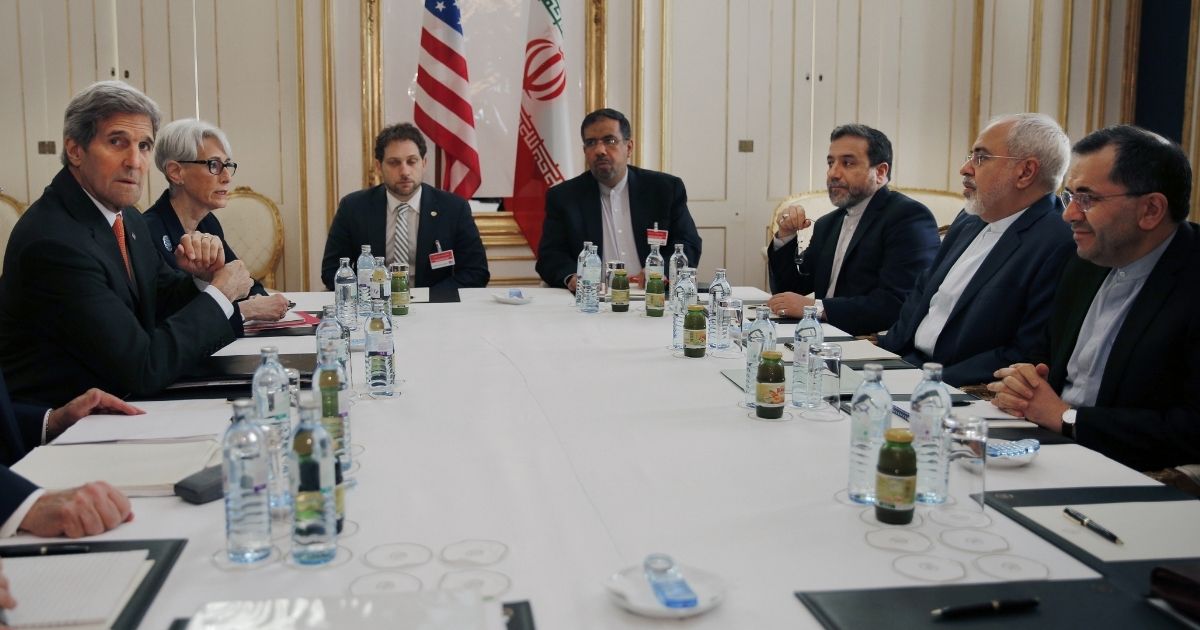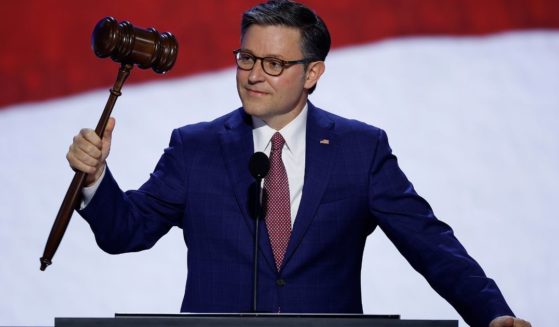
Biden's Team Forced to Negotiate with Iran from Position of Weakness After Taking Major Snub from the Islamic Republic
When President Joe Biden sent a team over to negotiations on the Iranian nuclear deal in Vienna this week, it wasn’t actually to meet with the Iranians.
The arrangement was charitably described as two separate “working groups” by chief State Department spokesman Ned Price, according to USA Today.
One of those working groups would be focused on getting the Iranians back into compliance with the agreement, known as the Joint Comprehensive Plan of Action, or JCPOA, in return for sanctions relief. The other would be focused on what sanctions the United States would have to lift to get back into the JCPOA.
American sanctions against Iran were restored in 2018, when then-President Donald Trump’s administration pulled out of the deal, citing concerns over whether it actually inhibited Tehran’s ability to develop its weapons capacity, nuclear or otherwise.
If reports are accurate, the “working groups” structure wasn’t quite how the Biden administration wanted the week’s sessions to go.
Axios reported last week that the “proximity talks” in Vienna, which didn’t involve Iranian or U.S. diplomats meeting, were necessary because Iran refused to entertain the American delegation, even when pressed during a virtual meeting of the JCPOA Joint Commission on Friday.
According to Axios, Iranian Deputy Foreign Minister Abbas Araghchi told one diplomat, “If the Americans are in Vienna at the same time and you want to talk to them, it’s OK with us, but we will not meet them.”
The Iranian side held to that even after France, Germany and the U.K. pressured them to sit down at the table with American diplomats, calling the Biden administration’s positions “more than reasonable.”
Axios reported “[t]he French representative was particularly forceful, telling Araghchi that Iran’s position was rejectionist and unhelpful, the Western diplomats say.”
And that’s why the United States was forced to negotiate from a separate room.
Price was still Pollyanna-ish about the talks, which are expected to continue Friday, according to Agence France-Presse.
“These remain early days, and we don’t anticipate an immediate breakthrough as there will be difficult discussions ahead,” he said, according to Axios. “But we believe this is a healthy step forward.”
Iranian Foreign Minister Javid Zarif didn’t exactly make it sound like he was anticipating a healthy step forward.
“At virtual JCPOA JC meeting, Iran & EU/E3+2 agreed to resume in-person talks in Vienna next Tues,” Zarif wrote in a Twitter post Friday.
“Aim: Rapidly finalize sanction-lifting & nuclear measures for choreographed removal of all sanctions, followed by Iran ceasing remedial measures.
“No Iran-US meeting. Unnecessary,” he concluded.
At virtual JCPOA JC meeting, Iran & EU/E3+2 agreed to resume in-person talks in Vienna next Tues.
Aim: Rapidly finalize sanction-lifting & nuclear measures for choreographed removal of all sanctions, followed by Iran ceasing remedial measures.
No Iran-US meeting. Unnecessary.
— Javad Zarif (@JZarif) April 2, 2021
Days before, Zarif had also lobbed a Twitter shot at the Biden administration for not removing the sanctions reimposed on Iran when the United States pulled out of the JCPOA.
“It’s sadly ironic that the State Dept is now calling on Iran to abide by the very deal the Trump administration abandoned.”@POTUS, 2019
Your admin follows Trump’s footsteps while trying to use his unlawful sanctions as “leverage”.
Nasty habits die hard. Time to kick this one. pic.twitter.com/PIhN1YwT3e
— Javad Zarif (@JZarif) March 30, 2021
Zarif was citing a tweet from Biden in 2019, commenting on how it was “sadly ironic that the State Dept is now calling on Iran to abide by the very deal the Trump administration abandoned” by abiding by the limits on nuclear material set by the JCPOA.
The difference, of course, was that the Trump administration had no intention of returning to the Iran nuclear deal without a serious renegotiation of its most problematic elements. As Laura Kelly noted in a piece in The Hill, the agreement only puts temporary limits on Tehran’s ability to develop nuclear weapons and does nothing to address the Islamic Republic’s conventional weapons programs or ability to wage war through proxy groups in other countries.
What Zarif is saying via that tweet is that Iran now wants sanctions relief from the Biden administration regardless of whether the United States rejoins the JCPOA. Biden, unlike Trump, isn’t exactly demanding serious concessions from Iran in return for the United States rejoining the deal, at least not yet.
While these are “early days,” as Ned Price pointed out, consider that President Biden’s point-man on the matter is U.S. Special Envoy for Iran Robert Malley — one of the key negotiators of the 2015 JCPOA under the Obama administration. While past behavior may not be indicative of future results, it’s evident whatever fixing Malley wants to do doesn’t come from a place of believing the deal was flawed from the moment it was agreed.
Even with this, the Iranians snubbed Biden’s envoys — believing, essentially, they could shunt them to the little kids’ table in Vienna.
On one hand, Iran can’t keep that up if it hopes for relief; U.S. sanctions have crippled the country’s economy, even given a promise by European JCPOA signatories that they would shield Iranian companies from the brunt of the impact, The Washington Post reported in January of last year. Furthermore, Iran handled the exigencies of the coronavirus pandemic worse than most other nations, compounding the misery.
On the other hand, consider the truculence with which the Biden administration is being met by the regime of Iranian President Hassan Rouhani. Then consider the fact that Rouhani was elected as a reformer who was supposed to be amenable to dealing with the West.
He hasn’t exactly turned out to be a reformer on a number of levels, as was noted in a 2017 piece in Politico by Ray Takeyh, a senior fellow at the Council on Foreign Relations.
But he’s still likely preferable to one of the hardliners expected to win in June’s presidential election. If the United States doesn’t rejoin the deal by then, negotiations will be nigh impossible — although don’t think that’ll stop Biden from trying.
Yet, if the United States had come to a JCPOA meeting under President Trump, I doubt the American negotiators would have been shafted to a separate room. If they were, they would have gone home.
Whether he agreed with the Trump approach or not, Biden should have learned from the past few years that the U.S. has the power to crush Iran’s economy. He also should have learned the value of negotiating from a position of strength.
Instead, after accepting this snub, he’s negotiating from a decided position of weakness. The results are likely to show it.
Truth and Accuracy
We are committed to truth and accuracy in all of our journalism. Read our editorial standards.
Advertise with The Western Journal and reach millions of highly engaged readers, while supporting our work. Advertise Today.












